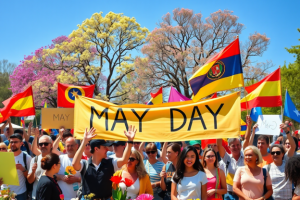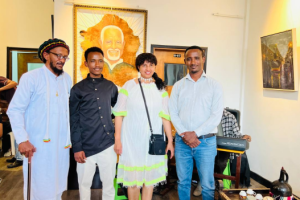
For most of us, holidays give us the opportunity for a break from the daily grind and a moment to foster positive attitudes, depending on how long a given holiday lasts. The social, psychological, economic, and health benefits of holidays are obvious. “Holidays are important because they offer a break from routine, allowing for relaxation, stress reduction, and the opportunity to connect with loved ones. They can also boost productivity by providing mental rejuvenation and promoting a different mindset for approaching tasks. Additionally, holidays can foster national unity and cultural understanding.” Because of the importance, holidays leave memories in our minds.
Holidays often leave powerful memories in our minds. The mind remembers Holidays are among the unforgettable experiences. They do not disappear easily although the mind remembers past experiences selectively. Childhood memories of holidays are often vivid and we remember them years or decades after our experiences. This can be a big topic worthy of a big non-fiction work. There must be a book of holiday reminiscences in every one of us. They are there, memories of holidays, hidden at the back of our minds and resurfacing back to our conscious mind every time holidays come to remind us of our lost time. It is something like the Marcel Proust’ seven-volumes long novel, maybe his masterpiece, “In Search of Lost Time”.
By the way, this novel is also about the remembrance of childhood. According to Wikipedia, “In Search of Lost Time” follows the narrator’s recollections of childhood and experiences into adulthood in late 19th century and early 20th century high society France.” Our childhood reminiscences or stories are part of our rites of passage. Childhood has its rites of passage, and they are many. We have many stories to tell about some of the most interesting periods in our lives. The stories are always vivid and always fresh. Every one of us has at least one story worth telling the world. Memories of New Year? Well, they are always fresh in our minds because they seem to defy time, and they are part of our early nostalgia.
We remember the New Year, usually with its cold and daily drizzles, followed by the thin cotton-like clouds that floated in the sky over our heads. The mud that stuck on our new shoes that we put on for the holiday leaves a vivid memory in our minds. How much we wept, screamed, and fought for those shoes! The evening bonfires, the songs mixing with the whistles of our whips, and the explosions from the small firecrackers that illuminated the dark nights. How about memories of Easter? They are many and most of them are inspired by the smell of smoke and foods on the eve of the holiday, floating in the air around the village, the return from the evening prayer and the eagerness to return home after 3:00 AM for breaking the fifty five days fast when entire families gathered to enjoy the famous holiday specialties that were absent from the tables in the last two months. The morning coffee gatherings of neighbors who announced the beginning of the holiday with their loud, “Happy Fassika!” wishes … why do these events stay in our memories longer than usual?
By the way, what is Easter or Fasika as we call it here? According to official sources, “Ester is a Christian festival which marks the resurrection of Jesus Christ. For many Christians, Easter is a celebration of the triumph of life over death, and a very important time of the year. Many non-Christians also have a holiday at this time, so it is a popular time to travel or spend with friends and family.” Fassika is a big travel time for Ethiopians, too. Travel of people from one region of the country to another or from abroad to the country. The travels are not as big for instance, the famous mass movements of the Chinese during their New Year.
Tens of thousands of Ethiopians from the Diaspora converge to celebrate this day and visit their families. This is also a convenient time or occasion to reminisce about the good or the bad old days, depending on our individual experiences. Religious festivals are powerful moments that trigger massive demographic upheavals depending on the number of their followers. According to a 2015 data, Christianity is the biggest religion and enjoys 2.3 billion followers worldwide, while Easter is celebrated differently in different countries.
In Russia, for instance, Easter is known as Paskha. It is a deeply religious celebration with the most significant religious service taking place on Easter Saturday evening. The service, which often starts before midnight and continues into Sunday morning, includes a procession around the church and the greeting “Khristos Voskres!” (Christ is risen), answered with “Voistinue Voskres!” (He is risen indeed). Families also enjoy coloring eggs, baking kulich and other dishes. Kulich is a special Easter bread often decorated with fruits and nuts and is a staple of the Easter meal. Painted eggs, Egg Fights”, sharing that consists of sharing leftover foods with friends, neighbors, or strangers is a well-known tradition. Other traditions include bell ringing, or the ringing of church bells on Easter Sunday, marks the beginning of the celebrations. Giving gifts to needy people is also a longstanding Easter tradition in Russia.
The dates of Easter celebrations also vary from country to country and from region to region. Sometimes they celebrate it on different days, while at other times they celebrate it on the same day. This year for instance, churches both East and West Easter, the Day of Resurrection on the same date: Sunday. April 20, 2025. This is notable because Western churches -Catholics of the Latin Church and most Protestants follow the Gregorian calendar.
The Ethiopian Easter is considered different, “Because the Ethiopian Orthodox Church views the death and resurrection of Jesus Christ as far more significant than his birth. “However, Orthodox Christians in Ethiopia, Serbia, and Russia follow the Julian calendar. That is the reason why they celebrate Eastern on different days.
There is also another reason why Ethiopian Orthodox Christianity is different from other countries. “The Ethiopian Orthodox Church is part of a separate body of churches called oriental Orthodoxy that also includes the Coptic, Armenian, and Syrian Churches. These Churches separated from the Eastern Orthodox over the definition of Chartist as having two Natures and instead believe he has a single Divine-Human nature.” The history of the Christian church is not only long but also more complex than anyone can guess. The main point is that Easter is the most important holiday of the year in almost all Christian countries, while the way it is celebrated varies from place to place and from person to person, depending on age, gender, and social status.
For instance, our childhood memories of holiday celebrations are simple, vivid, and sweet. However, they are likely to change and undergo a major transformation during our adult years. Many people may not remember how they spent last year’s Easter. Others may completely forget about it. It depends on which part of our brain is used for short-term or long-term memory storage. Memories are accumulated in our minds, and they are easier to remember because they are strongly imprinted when our brains were younger and more receptive to new experiences.
They say that our brain works in mysterious ways. Why do we have vivid memories of our youth while those we experience in later years are blurred and often quickly forgotten? This was the million-dollar question that neuroscience had been wrestling with before the discovery of the way the brain handles memory and experiences. Meanwhile, holidays might offer the best opportunities for people to take a trip down memory lane and revisit their lost time. I hope you may deal with such esoteric issues while enjoying your holiday lunch. It may at least help digestion. Sounds cute.
BY MULUGETA GUDETA
THE ETHIOPIAN HERALD WEDNESDAY 23 APRIL 2025





